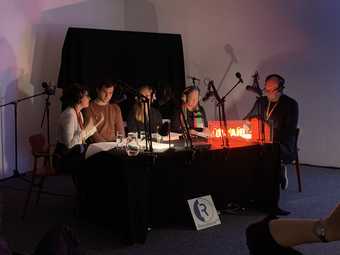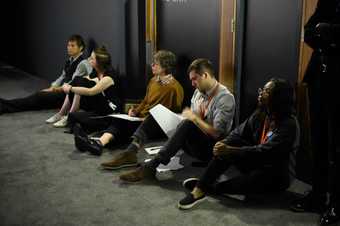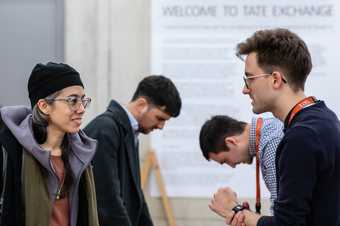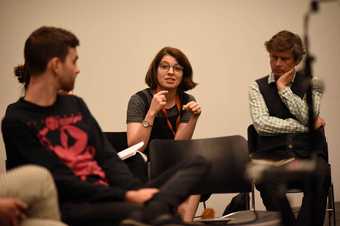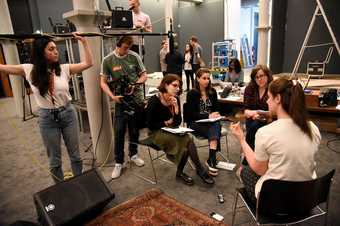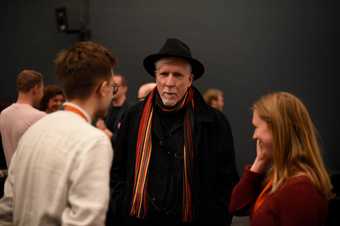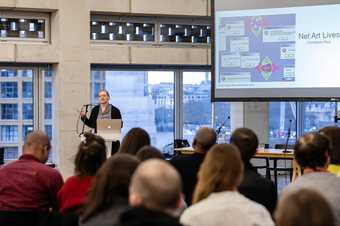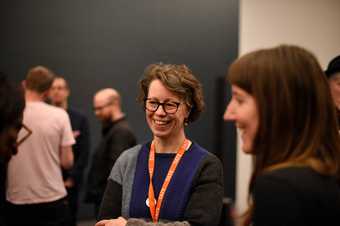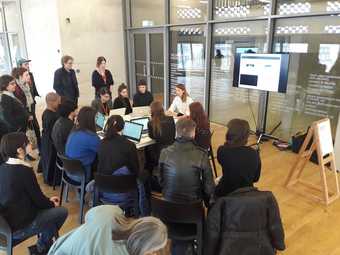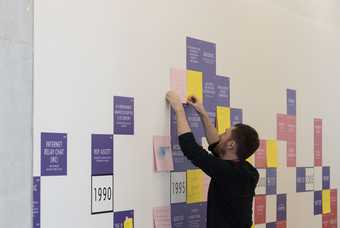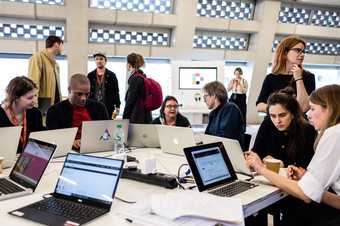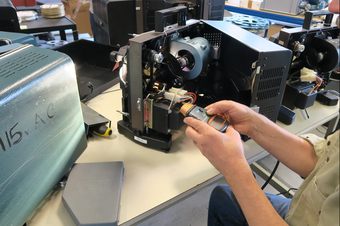Professor Pip Laurenson
Head of Collection Care Research and Project Lead, January 2018 – December 2022
Pip’s role as Project Lead for ‘Reshaping the Collectible’ builds on nine years as Head of Collection Care Research at Tate, directing research into new models for collecting and conserving performance, film, video and software-based art. She received her doctorate from University College London, is an accredited member of the Institute for Conservation and holds a special chair as Professor in Art, Collection and Care at the University of Maastricht in the Netherlands. Pip is committed to interdisciplinary research that serves and responds to the art of our time, and to exploring what it means for a contemporary art museum to be a research organisation.
Dr Bergit Arends
Deputy Head of Collection Care Research, August 2018 – September 2019
In her role as Deputy Head of Collection Care Research, Bergit supported the project’s infrastructure, the development of the research, and its publishing outputs. Prior to this she was Acting Head of Research at Science Museum Group. Her PhD thesis of 2017, completed at Royal Holloway, University of London, is titled ‘Contemporary Art, Archives and Environmental Change in the Age of the Anthropocene’; before that, Bergit studied Curating at the Royal College of Art, London. As an academic researcher and curator of contemporary art, she creates interdisciplinary research environments and develops research capacity within museums.
Dr Lucy Bayley
Post-Doctoral Researcher, July 2018 – February 2021
Dr Lucy Bayley is the project’s Post-Doctoral Researcher. Recently awarded a doctorate for a thesis exploring audiences and exhibitions at London’s Institute of Contemporary Arts (1949–1986), she also lectures at Sotheby’s Institute. From 2007 to 2013 she was the Curator of National Programmes at the Contemporary Art Society, and has previously worked at Drawing Room, Serpentine Galleries, Matt’s Gallery and PEER. Interested in histories of exhibitions and cultural institutions, Lucy’s research on the project starts from a mapping of Tate’s history of collecting, examining moments of change as a dialogue between that artwork and the collection.
Sarah Haylett
Archives & Records Management Researcher, July 2018 – June 2021
Sarah received her MA in Archives and Records Management from UCL in 2011 and has previously worked at the British Library, Zaha Hadid Architects, The Photographers’ Gallery, and most recently as Archivist and Collection Manager for a private art collector in London. Sarah will be researching how Tate’s institutional records and archive capture the life of an artwork in the contemporary art museum. Looking beyond a culture of compliance, she is interested in how this information can be presented to audiences and more effectively support research and collecting practice. She will also provide records management guidance to the project team.
Stephen Huyton
Collection Registrar, Research, July 2018 – June 2021
Stephen is the project’s Collection Registrar, Research and is embedded as a researcher within Tate’s Acquisition and Long Loan Registrar team. He has been working in the field of museum registration since 2014, most recently as Assistant Collection Registrar for ARTIST ROOMS (Tate and National Galleries of Scotland), working with its international collection of modern and contemporary art. Stephen’s research focuses on Tate’s collection management, documentation and registration working practices, and will look at how particularly challenging artworks question the institution’s notions of status, classification and collectability.
Dr Hélia Marçal
Fellow in Contemporary Art Conservation and Research, June 2018 – July 2020
As Fellow in Contemporary Art Conservation and Research and a researcher embedded within Tate’s Time-based Media Conservation team, Hélia’s role combined research into theory and practice. Prior to starting this role, she had been working on the conservation and exhibition of performance-based art since 2011. She received her PhD in Conservation and Restoration of Cultural Heritage from NOVA University of Lisbon in 2018. Her research looked into conservation practices at Tate with a feminist epistemological lens while exploring issues of performativity, participation, partiality and positionality.
Vanessa Peterson
Digital Producer, Research, March 2019 – September 2020
Jess Sully
Collection Care Research Manager, March 2020 – January 2023
Jess provides project management support for Tate’s Collection Care Research projects and initiatives. She has driven work on two Reshaping the Collectible case studies: Remastering, Remaking, Reproducing and Richard Bell’s Embassy, and was the organiser of the Reshaping the Collectible: Learning Through Change conference.
Kit Webb
Research Manager, Reshaping the Collectible, October 2018 – October 2021
Kit provides organisational and research support to the project, coordinating the public events and workshops, the Visiting Fellowship programme and communication about the research both on- and offline.
Senior Academic Fellows
All these fellowships were made possible by a grant from The Andrew W. Mellon Foundation.
Sarah Cook
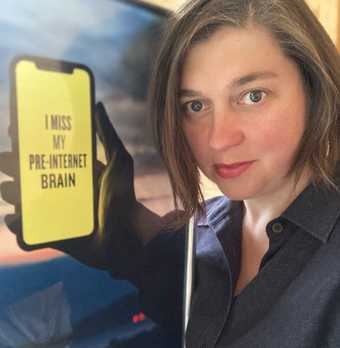
Sarah Cook joined Tate as the fourth and final Senior Academic Fellow for The Andrew W. Mellon Foundation-funded project Reshaping the Collectible: When Artworks Live in the Museum. Sarah has partly undertaken the fellowship from Scotland and partly onsite at Tate.
Sarah is a curator of contemporary art and for 20 years has curated exhibitions of media and digital art worldwide, in particular commissioning works for festivals including AV Festival, Transitio MX and NEoN (NorthEast of North) Digital Arts. She is Professor of Museum Studies in Information Studies at the University of Glasgow where she leads the course ‘Curating Lively Practices’ on the MSc in Museum Studies, and also holds the role of ‘theme lead’ for Creative Economies and Cultural Transformations in the soon-to-open Advanced Research Centre.
Her research addresses how artists use new technologies in their work and how the exhibition of this work can help us all understand the increasingly technological world we live in. In 2019 she curated ‘24/7’ at Somerset House, an exhibition reflecting on the non-stop nature of our daily lives and she has written about artists working with machine learning and AI, most recently in relation to the work of Trevor Paglen (at Barbican) and Tamiko Thiel (at The Photographers’ Gallery). Twenty years ago, as part of her doctoral work with BALTIC, Sarah considered the relationship of new media art to the museum, including studying examples of internet-based art at Tate. This fellowship allows her to revisit that work and trace its threads forward. The online network for curators of media art she co-founded – CRUMB, and its mailing list new-media-curating – is still used by curators and researchers today.
Her research at Tate aims to mind the gaps in curatorial knowledge about new media and digital art, particularly internet and networked practices. Sarah is particularly keen to help curators consider the long tail of their commissioning processes, the possibilities of restaging works and different models for the production and exhibition of digital art. The research will build on Sarah’s own history of using practice-based research and curatorial work to understand the intersection of art and technology and the challenges of presenting and preserving the work. It will also contribute to two planned book chapters – ‘New Media Art Curating in Theory and Practice’ for the Bloomsbury Encyclopedia of New Media Art and a chapter about agility for Museums and Digital Confidence: Capability, Competency and Literacy.
Over the course of her fellowship, Sarah is supporting the development of the project’s public-facing outputs, including a display at Tate Britain titled Lives of Artworks and a video about net art and the museum.
Links to Sarah’s curatorial work and writings can be found at www.sarahcook.info.
Haidy Geismar
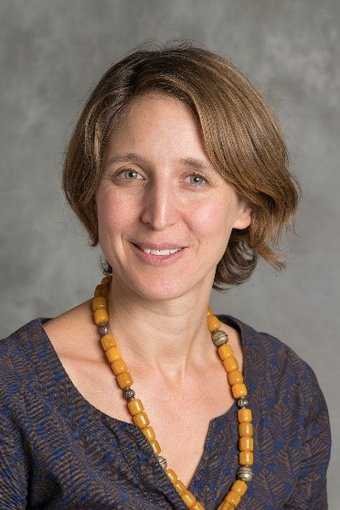
Haidy Geismar was the project’s first Senior Academic Fellow. Her fellowship ran from September 2019 to January 2020.
Haidy is a Professor of Anthropology at University College London, a curator of the UCL Ethnography Collections and Co-director of the UCL Centre for Digital Anthropology. Her research expertise lies in collaborative museum practice, indigenous museologies and indigenous contemporary art (Vanuatu and New Zealand).
The fellowship supported the development of longer-term projects, including an edited volume on impermanence. Haidy’s engagement with Reshaping the Collectible also prompted new writing, working on a paper that takes three core terms for the project – participation, social networks and decolonisation – and explores how they might be seen from inside one of the case studies.
Haidy’s fellowship closed with the convening of a talk for Collection Care staff. The event brought together four members of Te Maru o Hinemihi, a pūkenga, or specialist board of advisors established to raise awareness and support the conservation of Hinemihi. Hinemihi is a traditional Māori meeting house from Te Wairoa, Aotearoa (New Zealand) and now at Clandon Park in Surrey, England.
Through their talk, Samantha Callaghan, Anthony Hoete, Dean Sully and Haidy discussed how the group could be understood as a strategy of care, working within different structures (whether the National Trust Friends organisation or those from Aotearoa). A discussion followed about the lessons that could be drawn from their work for contemporary art conservation.
You can read more about Haidy’s time at Tate in this short interview published by UCL. Haidy’s UCL profile provides more background on her research and previous publications.

